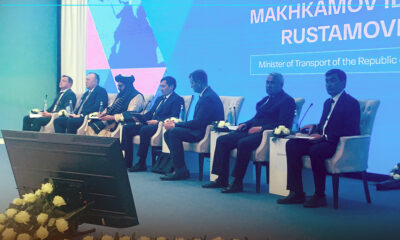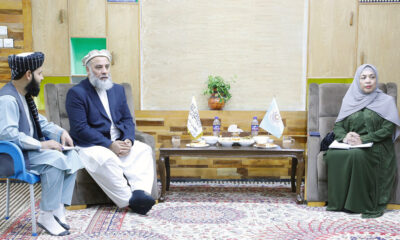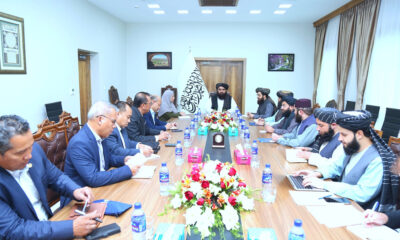Latest News
Minister of energy in Uzbekistan for talks on electricity supplies

Abdul Latif Mansoor, Minister of Energy and Water (MEW), has traveled to Uzbekistan to discuss the extension of the electricity purchase agreement with the neighboring country’s officials.
“You know that we have a contract with Uzbekistan and the electricity supply has been reduced these days. Therefore, we are talking to them to solve this problem and we want to import more electricity to Afghanistan and the trip is for this purpose,” said Mansoor.
Officials from the ministry say that the Islamic Emirate has paid Uzbekistan for electricity and they are hoping Tashkent will increase the amount of electricity exported to Afghanistan.
“In some provinces, including the capital, there is a problem of outage of electricity, and to solve this problem, a delegation from the Ministry of Energy and Water and Da Afghanistan Breshna Company have traveled to Uzbekistan,” said Ghulam Jelani Haq Parast, director of publications of MEW.
Power outages have severely affected manufacturing companies in recent weeks, and business owners have appealed for electricity supply problems to be resolved as soon as possible.
“I hope that the visit of the Minister of Water and Electricity of the Islamic Emirate of Afghanistan to Uzbekistan will bring results, because Afghanistan’s industries, especially in Kabul, are in a very critical state in terms of outage of electricity,” said Sakhi Ahmad Payman, deputy head of Afghanistan’s Chamber of Industries and Mines.
“Currently, sixty to seventy percent of our factories have stopped [operations],” he added.
Meanwhile, economic experts say that imported electricity has always been a problem for Afghanistan and that the government should invest more in electricity production inside the country.
Afghanistan currently relies on Tajikistan, Uzbekistan, Turkmenistan and Iran for 70 percent of its electricity, and pays millions of dollars to these countries every year.
Latest News
Afghanistan’s minister of transport and aviation attends regional meeting in Uzbekistan

Hamidullah Akhundzadeh, acting Minister of Transport and Aviation, headed a delegation to Uzbekistan for a ‘Six-Party Corridor’ meeting that included representatives from Afghanistan, Russia, Belarus, Pakistan, Kazakhstan and Uzbekistan.
On the sidelines of this meeting the Afghanistan delegation discussed trade through the corridor with the other five relevant countries.
According to the ministry of transport and aviation, Akhundzadeh met with the deputy ministers of transport of Russia and Belarus.
He also discussed ways to expand transit between Afghanistan and Russia; and Afghanistan and Belarus, and provide the necessary facilities to achieve this.
The ministry added that the acting minister had a bilateral meeting with the Minister of Transport and the Special Representative of the President of Uzbekistan on Afghanistan and discussed the expansion of road transport between the two countries.
Latest News
Malaysian delegation arrives in Kabul for talks with government
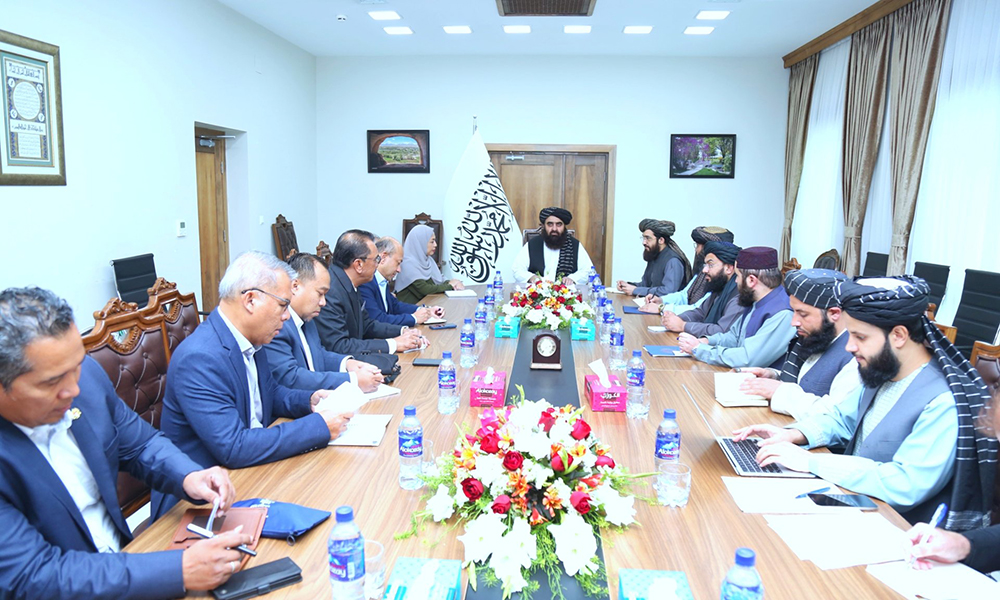
Representatives of Malaysia’s ministries of foreign affairs, defense and interior and advisors of the Malaysian Prime Minister and the Special Representative of Malaysia for Afghanistan arrived in Kabul this week for meetings with a number of high-ranking officials.
The Islamic Emirate’s foreign minister Mawlavi Amir Khan Muttaqi met with the delegation and thanked Malaysia for assistance it has provided over the past few years, including aid for the victims of the deadly Herat earthquake.
Muttaqi said in the meeting that existing diplomatic, religious, cultural and economic relations between the people and governments of Afghanistan and Malaysia were expanding.
“There are business and investment opportunities in various fields,” Muttaqi told the delegation.
“Afghanistan follows a balanced and economy-oriented foreign policy in the political and economic field. Afghanistan’s relations with the international community are expanding and it has established good relations with neighboring and regional countries,” said Muttaqi.
Afghanistan is keen to expand its relations with the countries of Southeast Asia, he added.
Muttaqi further said: “The Afghan government wants the Malaysian government to provide health and education facilities for the 3,000 Afghans currently living in Malaysia.”
At the same time, members of the Malaysian delegation said that the Malaysian government wants to expand relations with Afghanistan in various fields.
The delegation positively evaluated the political situation in Afghanistan and said they hoped a Malaysian trade delegation would visit Afghanistan in the near future.
One delegate, Dato Shazlina said: “Malaysia is determined to organize short-term training programs for Afghan diplomats, training programs in the field of information technology, accounting and development for Afghan civil service employees and in this regard cooperate with Afghanistan in organizing professional programs.”
The political deputy prime minister, Mawlavi Abdul Kabir, also met with the delegation and said the Islamic Emirate has achieved much in the economic and political sectors, and that the world, including the region, has no need to be concerned about Afghanistan.
Latest News
Russia’s special envoy meets with IEA ministers, discusses bilateral issues
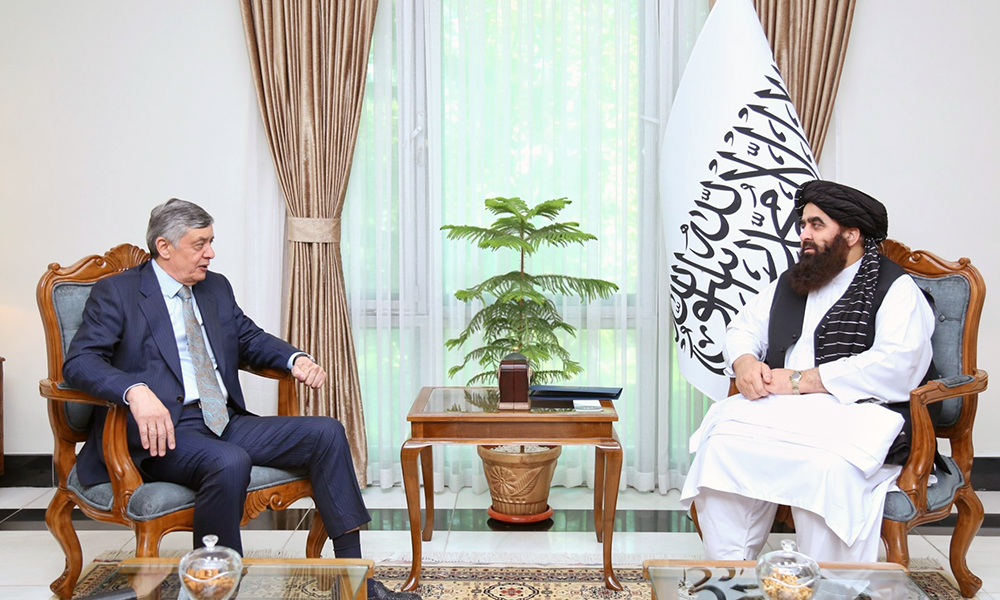
Zamir Kabulov, the Special Representative of the President of the Russian Federation for Afghanistan, who is on a visit to Kabul, has met with the Minister of Foreign Affairs of the Islamic Emirate Mawlavi Amir Khan Muttaqi for talks on political and economic issues between Afghanistan and Russia.
Regional issues were also discussed.
Muttaqi expressed appreciation for Russia’s support at regional and international meetings and emphasized the need to further strengthen political ties and trade relations between the two countries.
He also said that Afghanistan’s relations with countries in the region are flourishing and currently Afghanistan has active embassies in all neighboring countries.
Muttaqi called Afghanistan’s relations with Russia important and said the current ground realities of Afghanistan should be understood and that there is no reason why the United Nations needs to appoint a special representative to deal with Afghanistan.
He said the Afghan government is in talks with the UN over this issue and will make public its position after sufficient clarification has been provided on the agenda and composition of the next UN meeting in Doha.
Kabulov in turn stressed that any meeting held on Afghanistan should be convened with the approval of the Afghan government.
He said it is important for the United Nations to have the Afghan government approve and attend the next Doha meeting.
He said this series of meetings will not yield positive results without the Afghan government being in agreement.
He also said governments of the world should maintain relations with the Afghan government through bilateral mechanisms instead of multilateral contact mechanisms.
Kabulov emphasized that the US should release Afghanistan’s frozen assets and end its unilateral and “illegal” restrictions on the country’s banking system.
He also said Russia and Afghanistan need to improve coordination between them and went on to say he hoped Muttaqi would visit Moscow during the course of this year.
Kabulov also met with acting Minister of Interior Affairs Sirajuddin Haqqani.
This meeting focused on bilateral relations between both countries while political and security issues pertaining to the region were also discussed, the ministry said.
-

 Sport5 days ago
Sport5 days agoRashid Khan threatens BBL pullout after Australia postpones Afghanistan T20I series
-

 Sport4 days ago
Sport4 days agoAfghanistan Champions League kicks off with grand opening ceremony
-

 Latest News3 days ago
Latest News3 days agoPakistan’s frontiers minister stresses ‘dignified’ return of Afghan refugees
-

 Regional4 days ago
Regional4 days agoIran’s foreign minister downplays drone attack, says Tehran investigating
-

 Latest News5 days ago
Latest News5 days agoTen people killed by floods in Helmand
-

 Business4 days ago
Business4 days agoAfghanistan’s economic prospects are bleak: World Bank
-

 Latest News4 days ago
Latest News4 days agoMore than 800 Afghan refugees deported from Pakistan in two days
-

 Regional2 days ago
Regional2 days agoIranian president lands in Pakistan for three-day visit to mend ties


